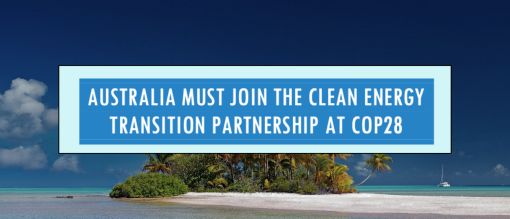Pacific leaders urge Australia to stop financing fossil fuels through foreign aid and export finance
Today, a group of nine civil society groups from Tuvalu, Kiribati, Vanuatu, Papua New Guinea and the broader Pacific wrote to Prime Minister Anthony Albanese, Minister Chris Bowen and other government officials in a public statement urging Australia to join the Clean Energy Transition Partnership at COP28. The statement was endorsed by twenty-three Australian civil society groups, including Jubilee Australia Research Centre.
Australia has yet to join over forty signatories around the world – including the USA, France, Germany, the UK and Sri Lanka – in the Clean Energy Transition Partnership (CETP), also known as the Glasgow Statement. The Clean Energy Transition Partnership requires governments to end public financing of fossil fuel projects through their export credit agencies and development assistance to multilateral development banks, which are forms of financing often crucial to getting a fossil fuel project off the ground.
Yesterday the Norwegian government announced they would also sign on to the CETP, putting Australia in a minority of OECD member states who have not signed. As a major oil and gas exporter, Norway's announcement is further emphasising the need for Australia and other laggards to begin phasing out fossil fuels.
In their statement today, Pacific groups shine a spotlight on Australia’s responsibility as the world’s third largest fossil fuel exporter to urgently phase out fossil fuels to address the existential threat climate change poses to their Pacific neighbours’ survival.
‘Australia, as our big sister in the Pacific, must listen when we say there can be no more investment in fossil fuels if Pacific communities like mine are to survive,’ said Flora Vano, Country Manager at ActionAid Vanuatu, in today’s statement.
Action on the climate crisis is also critical to gender equality in the Pacific: “Women in my country are drawing on the wisdom and knowledge of our traditions and cultures, as well as from proven technologies and science, to drive community-led solutions to the climate crisis.
‘But we cannot do it alone, nor should we have to,’ Flora stated.
In recent years, Australia’s export finance program has created controversy by financing both domestic and overseas fossil fuel projects.
Export Finance Australia provided over AU$500 million in financing and re-financing to PNG LNG, Papua New Guinea’s first major gas project owned by ExxonMobil, between 2009 and 2012. The project has had disastrous consequences for local communities, yet the government hasn’t publicly ruled out further financing of the project in the wake of reports Papua New Guinean government agency Kumul was courting further funding support.
A 2023 joint report by Jubilee Australia Research Centre and ActionAid Australia, Hidden Cash for Fossils, found that in the five years after the Paris Agreement, Australia could have directed an estimated over AU$800 million to fossil fuel projects via its contributions to multilateral development banks.
‘While the Albanese government is enthusiastic about bolstering renewable energy investments, it has yet to explain to the Australian public how it plans to phase out its support for fossil fuels,’ said James Sherley, Climate Justice Campaigner at Jubilee Australia Research Centre.
‘They are undermining our transition to renewables by continuing to funnel taxpayer money into fossil fuels through our export finance and foreign aid programs. In terms of cutting carbon emissions, it’s like pulling the hand brake with your foot down on the accelerator.
‘The government must heed calls from our Pacific neighbours and follow their leadership at COP28. Signing onto the Clean Energy Transition Partnership can be Australia’s first step on the road to ending its ongoing support for a dying industry.’
You can view the joint statement here.
